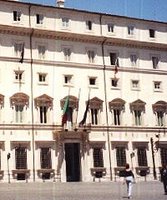Future in Palazzo Chigi
 Slowly, it looks as if it will be Romano Prodi moving into Palazzo Chigi in Rome. But it will take its time - late May seems to be the earliest possibility as things stand now.
Slowly, it looks as if it will be Romano Prodi moving into Palazzo Chigi in Rome. But it will take its time - late May seems to be the earliest possibility as things stand now.But this Prodi government is unlikely to be the answer to the challenges that Italy is facing.
It will be too weak in terms of its support and to divided in terms of its policies. It will approach a caretaker government awaiting... yes, awaiting what?
The last decade has seen a genuine two-party system emerging in Italy, which has made it possible to break the virtual monopoly on power that was exercised by the old-style Christian Democrats for decades.
There is no doubt that this has been healthy for Italian democracy. It stands stronger and more vital today than two decades ago.
But this has come at the price of both of the two coalition alternatives beding dependent on parties on the extreme fringes of the political spectrum.
The old-style Communists have handicapped the centre-left, and the populist Lega Nord in the same way the centre-left.
After a time of Prodi government it might be time for Italy to move beyond the Berlusconi- and Prodi-coalitions and look at the possibilities of getting rid of the extremes and concentrating on true reforms.
In theory, the Forza Italia and the moderate centre-left ought to be able to get together around a reform program. If the moderate centre-left of Margerita would be willing to enter a coalition with Forza Italia, UDC and Alianza Nationale that would be a clear majority. Or if Alianza Nationale is excluded and the Democratic Socialists are included.
Indeed, Berlusconi after the election called for a German-type big coalition, although probably more in order to save himself than for anything else.
It did, however, open a mental door to the future.
The next year or so will show if there is a possibility of sufficiently credible and strong Italian politicians being willing to walk through that door.
It would be good if it happened before an economic crisis makes it necessary anyhow.


<< Home